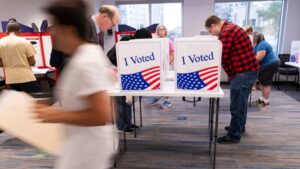How the Presidential Election and Public Debt Impact your Investments
With the upcoming presidential election looming, many investors are concerned about how the outcome will affect their investments. However, there is another risk that financial advisors are closely monitoring — public debt. According to a recent survey from Natixis Investment Managers, 68% of U.S. advisors view public debt as the top economic risk, with 64% of advisors worldwide sharing the same sentiment. This survey, which gathered insights from 2,700 respondents across 20 countries, sheds light on the growing concerns surrounding the escalating national debt crisis.
“No matter who wins the election, public debt is expected to continue to rise,” explains Dave Goodsell, the executive director of the Natixis Center for Investor Insight. The U.S. national debt currently exceeds $35 trillion and is on an upward trajectory, mirroring the actions of an individual who continuously uses a credit card without paying off the full balance each month.
The next President and Congress will inherit this mounting debt crisis, along with the impending trust fund depletion dates for Social Security and Medicare. More individuals are realizing that they may need to take control of their financial future, as showcased in the Natixis survey findings.
So, what can individual investors do to protect themselves from these broader risks? Marguerita Cheng, a certified financial planner and CEO of Blue Ocean Global Wealth, emphasizes the importance of proactive planning and strategic decision-making. While you cannot control government spending, you can control how you plan, save, invest, and react to market news.
Here are some key strategies to consider:
Diversify your portfolio
To safeguard against volatility risks and avoid chasing returns, maintaining a diversified portfolio is essential. Goodsell recommends incorporating non-correlated assets to offset stock risks, especially as the equity market continues to reach new highs. Bonds, both domestic and international, can provide a hedge against stock market fluctuations.
Adjust your tax exposure
With the likelihood of higher taxes due to the escalating national debt, it’s crucial to evaluate your tax exposure. Cheng suggests diversifying your investments across tax-deferred, tax-free, and taxable accounts to minimize taxable withdrawals. Utilizing accounts like Roth IRAs, 401(k) plans, 529 college savings plans, and health savings accounts can offer tax advantages for various expenses.
Pare back personal debts
In addition to the national debt, consumer debts have been on the rise. Managing personal debts and maintaining good credit can help reduce the cost of borrowing money and improve overall financial health. By paying bills on time and keeping debt balances in check, individuals can secure better interest rates and potentially lower expenses across various facets of their lives.
By taking a proactive approach to financial planning and implementing these strategies, investors can navigate the uncertainties stemming from the presidential election and rising public debt. Stay informed, stay diversified, and stay ahead of the curve to secure your financial future. Extreme Investor Network is here to guide you on your journey to financial success.

